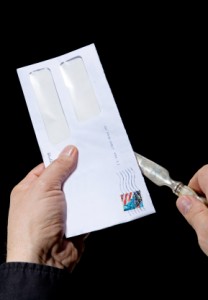Posted by Teresa on May 21, 2010 under Landlord Tips, Rents and Deposits | 
 Every landlord we know would agree with this understatement: rent is important. Actually, it’s more than just important—rent is like a fertilizer that keeps your rental business growing and healthy. Rent is as necessary to your rental property business as rain is to plants.
Every landlord we know would agree with this understatement: rent is important. Actually, it’s more than just important—rent is like a fertilizer that keeps your rental business growing and healthy. Rent is as necessary to your rental property business as rain is to plants.
If only collecting rent was as easy as collecting the rain when it falls from the sky. Rent collecting can be an easy task—or it can be a monthly struggle. It all depends on how you set up your leases, your management skills, expectations, and consequences.
Lease Language: Make sure your lease clearly states the amount of the rent, the day of the month rent is due, any grace period, late fees and when they are added, and number of days until eviction action is taken for non-payment.
Terms of Acceptance: Let multi-roommate units know that you do not accept multiple checks—you don’t want the hassle of chasing down several tenants for rent. Let your tenants figure out who owes whom how much, and collect one check from someone. Also, it’s best to avoid accepting partial payments. Evictions for non-payment are difficult to obtain if you’ve accepted a payment!
Manage the process: It’s up to you to determine how things are going to run in your rental property business. After all, nobody else is taking on the responsibility and liability of owning rental property. So manage your business like the boss that you are. Keep excellent records, establish procedures, and stick to them. Let your tenants know that you don’t waive late fees, and that you will file for eviction if they don’t pay within an agreed-upon time frame.
Expectations and consequences: If you’re managing your rental property well, your tenants know exactly what is expected for rent: they are to pay you on the day the rent is due, not later; they are to pay with one check; they are not to bounce checks; and they are to notify you if any of the previous terms are impossible, due to circumstances beyond their control.
It’s your job to clearly communicate your expectations to every tenant. Let them know up front the consequences for not meeting your expectations, too. Not every tenant has been asked to strictly keep to the terms of a lease. Let your tenants know that you expect them to, and they will be more likely to do so.
More and more landlords are turning to online rent collection. It’s a convenience for you and for your tenants. There are many services to choose from, so ask your friends in the business if they’ve had good experiences with online rent collection. It certainly eliminates the need to make runs to your post office box and the bank, as well as a tenant blaming the U.S. Postal Service for late rent checks!
Posted by Teresa on May 20, 2009 under Landlord Tips, Rents and Deposits | 
 If you’re a landlord, we hope you’ve already established solid policies and procedures for collecting rent and shared them with your tenants—in writing. If not, go do that immediately and come back when you’re through!
If you’re a landlord, we hope you’ve already established solid policies and procedures for collecting rent and shared them with your tenants—in writing. If not, go do that immediately and come back when you’re through!
For the rest of you, here are a few pointers for collecting rent that may help keep your blood pressure—and your bottom line—at a healthy level.
1. Do not allow multiple checks: Roommates might prefer to pay you separately for their share of the rent. The trouble begins when someone’s division is wrong or not all roommates pay promptly. It is not your responsibility to track down multiple tenants for rent on the same unit. Require them to figure out who owes whom and to present one check for the rent.
2. Remind tenants when rent is due: You could provide monthly invoices or reminders, or even a rent payment coupon book to help your tenants keep track of when their rent is due. For routinely slow payers, a phone call five days before rent is due is reasonable.
3. Contact tenants immediately if rent is late: Stay calm and businesslike, but do not hesitate to call tenants about late payments. Determine the cause of the problem, and inform them of their options.
4. Avoid accepting partial payments: If an excellent tenant requests a chance to pay in part, you can consider allowing this, but make them aware it is a one-time deal. And then, present the tenant with paperwork to sign: either an agreement to pay the rest by a specific date or a legal rent demand notice. And remember that in most states, accepting partial payments voids any prior legal notices for nonpayment of rent.
5. Offer small incentives for prompt payments: It may seem like a stretch in a down economy, but times like this are perfect for rewarding your tenants who pay on time. Purchase pizza or movie rental gift certificates and mail or hand them to your prompt paying tenants. Even small gestures encourage more good behavior.
6. Don’t consider a cash discount: Rather than charging a late fee, some landlords set the rent higher, and then offer a discount to entice tenants to pay rent on time. The courts have historically frowned upon this. If you want tenants who pay on time, then prescreening tenants is a better practice.
7. Don’t redeposit bad checks: If a tenant bounces a check, it is best to require a cashier’s check or money order to replace it. (And for all subsequent rent checks from that tenant.) But if they swear the bad check is now good, rather than re-depositing it, go to the tenant’s bank and either cash it or have them certify it so you can deposit it into your account without worry.
8. Don’t waive late charges: There is no good way to bend the rules. You have established policies to protect yourself from lawsuits—so follow them. Treating a tenant more favorably than others can lead to accusations of discrimination. Waiving late charges will mean you cannot reasonably begin charging them again.
9. Keep late charges and returned check charges reasonable: Many states have limits on how much a landlord can charge for late fees. Check out your local laws, too. Returned check fees should be based on what your bank charges you, plus enough to reimburse your time to deal with it. And remember, if your tenant makes good on a bounced check after your standard grace period, they are responsible for late fees as well.
10. Keep good records: If your tenants pay by mail, record the date you receive their checks. If they pay in person, give them a receipt. If you receive a rent payment by mail after the due date, keep the envelope’s postmark in case your tenant disputes a late charge.
 Every landlord we know would agree with this understatement: rent is important. Actually, it’s more than just important—rent is like a fertilizer that keeps your rental business growing and healthy. Rent is as necessary to your rental property business as rain is to plants.
Every landlord we know would agree with this understatement: rent is important. Actually, it’s more than just important—rent is like a fertilizer that keeps your rental business growing and healthy. Rent is as necessary to your rental property business as rain is to plants.
